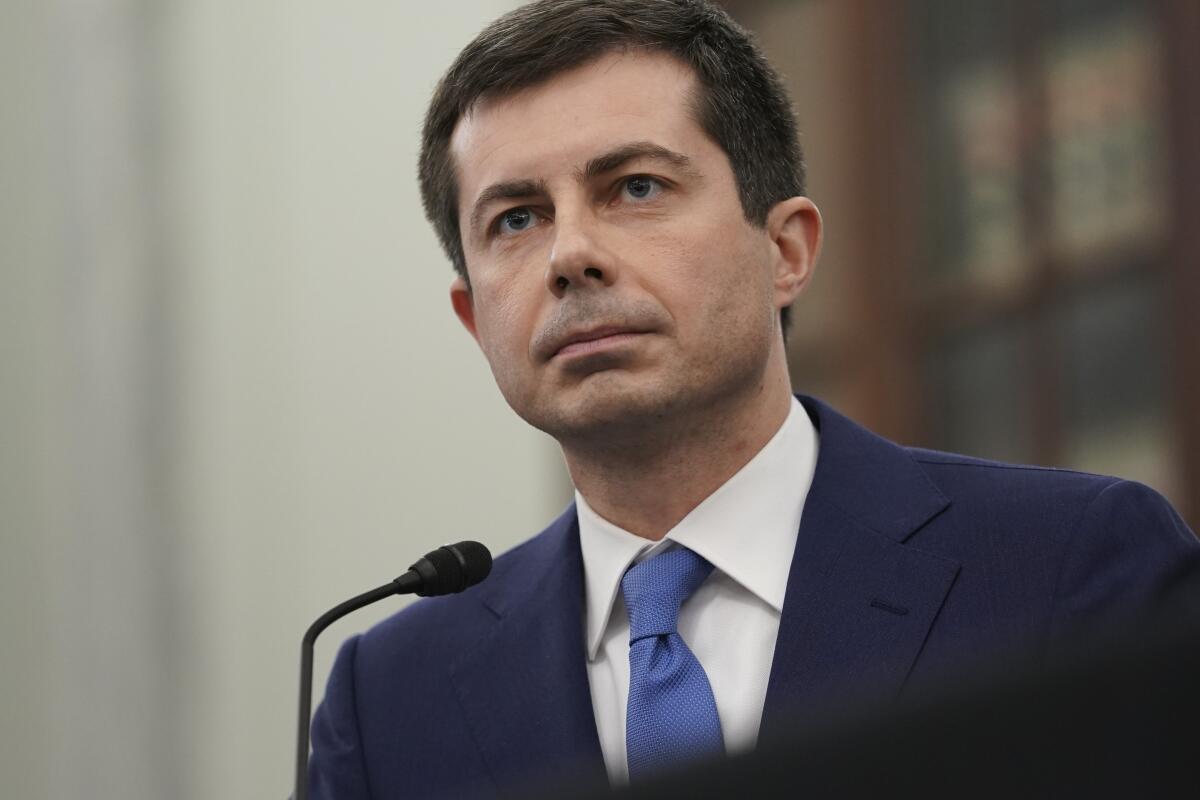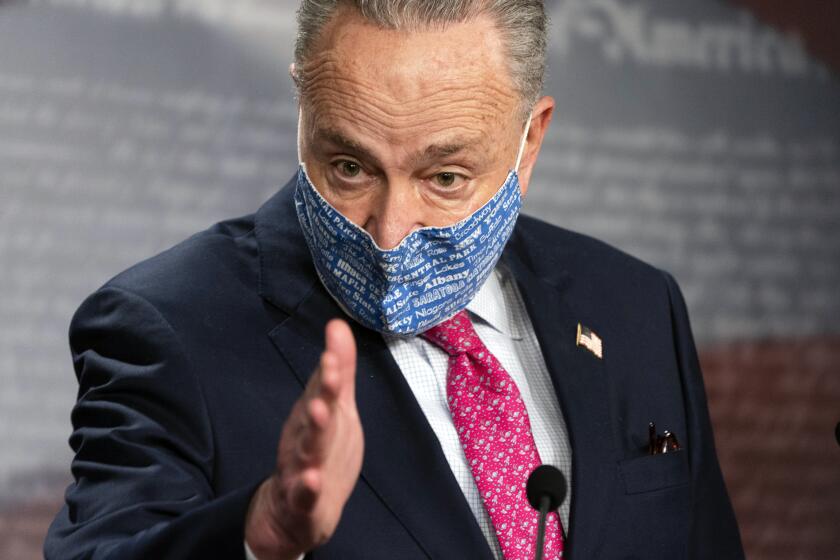Senate confirms Pete Buttigieg as Transportation secretary

- Share via
WASHINGTON — The Senate on Tuesday confirmed Pete Buttigieg as Transportation secretary, the first out gay person to take a Cabinet post, tasked with advancing President Biden’s ambitious agenda of rebuilding the nation’s infrastructure and fighting climate change.
Buttigieg, a 39-year-old former mayor of South Bend, Ind., and Biden’s onetime rival during the Democratic presidential primaries, was approved on a 86-13 vote.
Praised by Biden as bringing a “new voice” to the administration, Buttigieg takes over a Transportation Department with 55,000 employees and a budget of tens of billions of dollars. He has pledged to quickly get to work promoting safety and restoring consumer trust in America’s transportation networks as airlines, buses, city subway systems and Amtrak reel from plummeting ridership in the COVID-19 pandemic.
He is expected to play an important role in promoting Biden’s sweeping green initiatives, helping to oversee stronger automotive fuel economy standards to reduce greenhouse gas emissions and support the president’s push later this year on a $2-trillion climate and infrastructure plan. That plan will be focused on rebuilding roads and bridges and expanding zero-emission mass transit while boosting electric vehicle infrastructure, including building 500,000 charging stations over the next decade.
Senate Majority Leader Charles E. Schumer announced senators will vote Tuesday on a first step toward approving President Biden’s COVID-19 aid package.
Before approval by the full Senate, Buttigieg had cleared the Senate Commerce Committee on a 21-3 vote. Some Republican senators during his hearing signaled likely fights ahead over the cost and scope of updating the nation’s roads and bridges, rails and airports, questioning in particular the administration’s interest in redirecting money for climate initiatives. But they said they would look forward to further discussions with Buttigieg, including on their desired local projects.
“Transportation issues historically have been addressed on a bipartisan basis, and I expect to continue that practice with Mr. Buttigieg,” said Mississippi Sen. Roger Wicker, the top Republican on the panel, who praised his “impressive credentials” and intellect.
Biden hasn’t indicated how he intends to pay for an infrastructure plan, coming on top of the administration’s proposed $1.9-trillion virus relief plan that has met some headwinds in Congress. Buttigieg’s suggestion during his hearing that a gas tax hike might be needed was immediately walked back by his spokesman afterward.
“We need to build our economy back, better than ever, and the Department of Transportation can play a central role in this,” Buttigieg said at his confirmation hearing last week, noting that the transportation sector, particularly car emissions, is the single biggest contributor in the U.S. to global warming.
He stressed that creating jobs, tackling the climate crisis and addressing racial and economic inequality will drive funding decisions at the department.
The Afghanistan war veteran burst onto the national scene in 2019 after launching a long-shot presidential bid, introducing himself to voters as “Mayor Pete” and drawing initial skepticism due to his youth and limited government experience. He outperformed expectations after zeroing in on a message of generational change, finishing the first-in-the-nation Iowa caucuses in a virtual tie with Vermont Sen. Bernie Sanders.
But Buttigieg struggled to appeal to Black voters and dropped out of the race after a crushing loss to Biden in the South Carolina primary. Buttigieg chose to quickly endorse Biden, helping him solidify centrist support against Sanders’ strong liberal challenge.
Buttigieg, a Harvard graduate and Rhodes scholar, now points to his experience as a mayor and on the campaign trail as valuable to his ground-level approach to improving transportation. He described initiating a “smart streets” program to make South Bend’s downtown more pedestrian- and bicyclist-friendly while spurring hundreds of millions of dollars in economic investment.
He’s also expected to be a regular presence on TV, helping to sell the president’s policies as he did during Biden’s campaign. Since he was nominated, Buttigieg has appeared on “The View,” “The Tonight Show,” MSNBC’s “Morning Joe,” as well as Fox local affiliates, addressing topics such as Donald Trump’s impeachment, the treatment of veterans and his goals of promoting green-friendly travel.
Buttigieg brings diversity to the Cabinet. There hasn’t been an out gay Cabinet secretary before. Under President Trump, Richard Grenell, who is gay, served as acting director of national intelligence, but did not have to face Senate confirmation as an acting director. In the late 1990s, Senate Majority Leader Trent Lott blocked a confirmation vote on President Clinton’s pick for ambassador to Luxembourg, James Hormel, over his sexual orientation; Clinton ultimately installed Hormel with a recess appointment.
“Congratulations to Secretary Pete Buttigieg on his historic confirmation,” Alphonso David, president of Human Rights Campaign, an LGBTQ advocacy group, said after the vote. “This confirmation breaks through a barrier that has existed for too long, where LGBTQ identity served as an impediment to nomination or confirmation at the highest level of government.”
More to Read
Get the L.A. Times Politics newsletter
Deeply reported insights into legislation, politics and policy from Sacramento, Washington and beyond. In your inbox three times per week.
You may occasionally receive promotional content from the Los Angeles Times.











